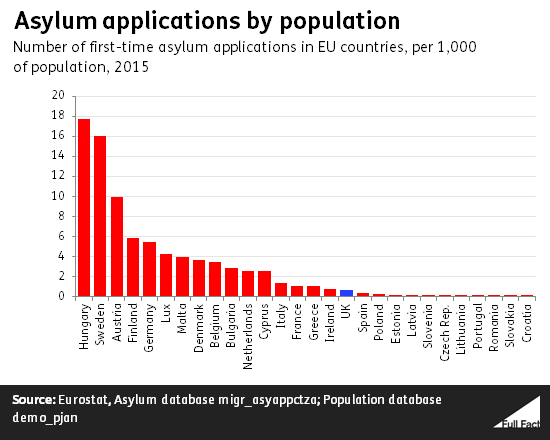Why do migrants and asylum seekers want to come to the UK?
There are two questions here. Is the UK really a top destination for people crossing the Mediterranean compared to other European countries? If so, why?
Join 72,953 people who trust us to check the facts
Sign up to get weekly updates on politics, immigration, health and more.
Subscribe to weekly email newsletters from Full Fact for updates on politics, immigration, health and more. Our fact checks are free to read but not to produce, so you will also get occasional emails about fundraising and other ways you can help. You can unsubscribe at any time. For more information about how we use your data see our Privacy Policy.
Britain as a destination for asylum seekers
The UK isn’t particularly high up the league table of countries by number of asylum seekers. Last year it had the eighth highest number of new applications in the 28-country EU, or the 17th highest in terms of existing population.

There isn’t much direct evidence to suggest that the UK is disproportionately favoured by asylum seekers.
The International Organisation for Migration carried out over 4,000 interviews with migrants earlier this year. It found that 6% of migrants “interviewed along the Central Mediterranean route” from North Africa to Italy said they intended to reach the UK.
Of those travelling through Hungary and the Balkans, the UK wasn’t a popular enough destination to be singled out in the analysis, which says that most wanted to reach Germany.
That tallies with another IOM study of 473 Iraqis now living in Europe, which asked about intended destination at the time of departure. Again, almost half chose Germany, and only a handful the UK. While almost one in three ended up in a different country to that intended, hardly anyone in this study reported a frustrated desire to get to Britain.
That said, there will be variation depending on nationality. More Eritrean citizens travelling via Italy nominated the UK than any other country in the IOM research, and a smaller December 2014 survey found that the UK was the most popular destination for Iranians preparing to emigrate.
Many people fleeing conflict will stay a lot closer to home. Only 40% of Syrians expressing a wish to emigrate in January 2015 said that Europe was their preferred destination, according to a Gallup poll. The UN refugee agency notes that “the majority of those who have fled the conflict is hosted in Syria’s neighbouring countries”.
Asylum seekers don’t always make considered decisions or have a choice to begin with
“This being the real world, there is no easy answer to the question ‘why?’”, as immigration lawyer Colin Yeo points out.
A report for the Refugee Council in 2010 found that two thirds of the 43 asylum seekers and refugees interviewed hadn’t originally intended to come to the UK.
It found that agents arranging clandestine travel were an important factor in determining where people end up. That echoes the finding of a Home Office study from 2002 that’s still cited in discussion of migrants’ motivations.
The Australian version of the House of Commons Library summarises the academic research on this issue as follows:
“asylum seekers generally have limited options available to them, and choices are made within a very narrow field of possibilities. Their choices and their journeys are often strongly influenced by the people smugglers, or agents, they engage to assist them”.
Social and economic factors are relevant, less so the availability of benefits
Researchers say that, where people can choose, factors such as colonial and historical links, the presence of family members, general reputation as a safe country and language are relevant factors.
There’s mixed evidence on whether people choose between countries based on their knowledge of its asylum system, according to Professor Heaven Crawley, a former head of Home Office asylum research. Some studies suggest that asylum seekers are drawn to countries with a more generous asylum regime, whereas others point to little or no knowledge about how the system works.
But economic opportunities, particularly being able to get a job, do play a role. As this suggests, there’s not necessarily an easy dividing line between ‘genuine refugees’ fleeing conflict on the one hand, and ‘economic migrants’ seeking new opportunities on the other. A person can easily be both.
It seems unlikely that the benefits system is relevant. Professor Crawley writes that “there is no statistically significant relationship between the level of social and welfare benefits and asylum applications”.
We’ve previously discussed why the UK’s welfare system is an unlikely pull factor for asylum seekers, and compared the cash support available to asylum seekers in different European countries.